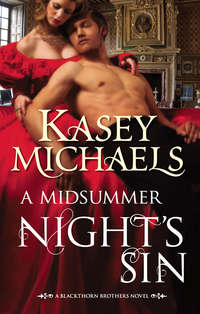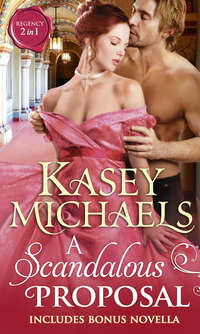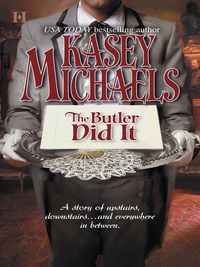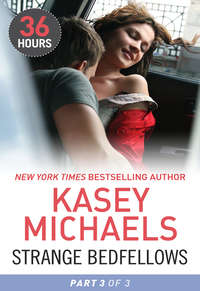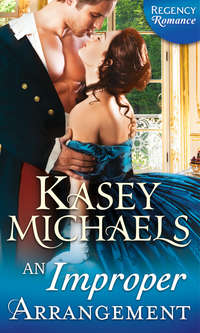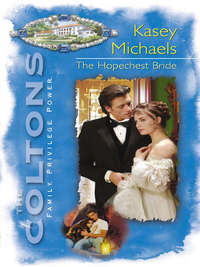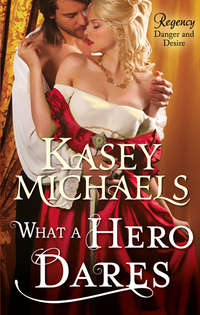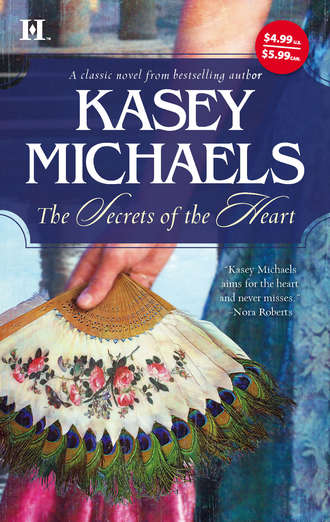
Полная версия
The Secrets of the Heart
“You may have been amused, but I think the entire episode was distasteful in the extreme,” Lady Ariana said feelingly, knowing now for certain that Lord Undercliff would be safe from social disaster, thanks to St. Clair. “In fact, Christian, much as it pains me to agree with that crude man, the best thing that could happen is for that absurd Peacock and his band of marauding brigands to be captured and dealt with as rapidly as possible. Did you hear those silly women? They seem to believe the man is to be admired, when everyone knows he is little more than a thief, a ruffian. You’d think they didn’t know the price of goods will rise twice for every penny the mill owners are forced to raise wages. Why, Papa says—”
“Ah, dearest child, you aren’t about to tell me what your papa says again, are you?” St. Clair interrupted wearily. “The man,” he explained, looking at Gabrielle, “like our suspicious home secretary, Lord Sidmouth, sees insurrection lurking around every corner.”
“But it’s true, Christian,” Lady Ariana persisted, sure she could show up the country miss with her knowledge of government. “The Peacock is inciting the populace to illegal acts. Why, he’s even worse than that odious Orator Hunt, telling the common people that they deserve better. Why? We are all suffering now that the war is over. It isn’t only the ungrateful peasantry that has had to live with deprivation, but to have to maintain iron gates on our townhouses in order to keep the rioting rabble away is preposterous. Or do you wish to see a copy of the late French Revolution brought to our own doors?”
“Tiens! Why would I care a snap about such farfetched nonsense? What I do wish, dear girl, is for you to desist in being such a staunch little Tory and remember that bluestockings tend to frighten off suitors, most especially dukes. Or do you believe I shall be amused to champion you when you are in your fifth Season, long in the tooth and still prosing on and on about insurrection?”
“If you’re still powerful enough five years hence to wield any influence at all over Society,” Miss Laurence piped up, causing Lady Ariana to draw in her breath in surprise at the girl’s daring in defending her. “I would say the Peacock has already begun to make inroads on your consequence. After all, breathlessly awaiting your entrance in order to admire the cut of your latest new coat barely compares with hearing of the daring exploits of the Peacock. Are you jealous, St. Clair?”
“Hardly, Miss Laurence,” St. Clair replied with a smile, so that Lady Ariana longed to box his ears. Didn’t the man know when he was being insulted? Then he went on, renewing Lady Ariana’s faith in him: “But you must tell me, my dear: Are you to be numbered in the growing multitude of eager ladies wishful of having the Peacock kidnap you as he did Mr. Symington, not to punish you, but to whisk you away for a night of unbridled passion?”
His words were a slap in Gabrielle Laurence’s face, reducing her to a witless child who not only couldn’t see the danger in the Peacock’s provoking exploits but also one who was so infantile as to indulge in romantic musings about the man. Lady Ariana found herself almost feeling sorry for the senseless chit who had thought she might get the better of St. Clair.
Except that Gabrielle did not seem to take offense at St. Clair’s words. “You’re nearly correct, my lord,” she answered as she moved away from him and toward Lord Buxley, who had reappeared in the ballroom and was even now heading in her direction. “I am quite taken with the Peacock. It would, after all, be such a social coup to be the one who unmasks him. Oh, and by the bye, St. Clair, I believe I should point out that you slipped just now and referred to Lord Undercliff’s uninvited guest by his correct name, proving that even you have not been unaffected by the Peacock. Either that, or you are not as witless as you would have us all suppose. Interesting thought, isn’t it?”
St. Clair stuck his quizzing glass to his eye as he watched her go. “Odds fish, Ariana, I begin to believe I have petted our little country kitten just so she could hiss and scratch at me. I vow there is no gratitude left in this world. No gratitude at all, although I imagine Undercliff will be trailing after me soon, wearying me with his thanks. Ah, the tribulations of social consequence. Sometimes, dear lady, I question whether the prize is truly worth the trouble.”
“Anything is worth it to people like us, Christian, as social consequence remains the be-all and end-all of our existence,” Lady Ariana said quietly, watching Miss Laurence and Lord Buxley move off toward the supper rooms, mentally restructuring her earlier opinion of the young lady and wondering if it would not be possible to become friends with her, if just to bedevil St. Clair, who seemed to derive great pleasure from setting the two beauties at each other’s throats.
CHAPTER THREE
Men are but children of a larger growth.
John Dryden
THE SMALL PRIVATE STUDY situated on the second floor and to the rear of the St. Clair mansion in Hanover Square was crowded with long-legged men slouched at their ease in burgundy leather chairs ringing the blazing fireplace, their discarded jackets draped behind their heads, cravats hanging loose, snowy white shirts undone at the neck, their hands gripping glasses of warmed brandy, for the April day had gone damp and chilly.
Lord Osmond Osgood, who had stayed so long at the Undercliff Ball card tables the previous evening that his usually indifferent luck at gaming had finally turned in his favor sometime just before dawn, stretched and yawned widely as he languidly waved away Sir Gladwin Penley’s offer of a cheroot.
“Haven’t the energy, Winnie, thanks just the same,” he said. “Suckin’ in, blowin’ out, tappin’ the ashes. And there’s the singein’ of m’cravats, and fishin’ pieces of tobacco off m’tongue—and for what? Like the smell, can’t abide the taste. I’ll just breathe in whenever you blow a cloud if it’s all right with you. I say, did I tell you how much I won?” he ended, winking.
“That you did, Ozzie—twice,” Sir Gladwin answered dully, the rarely animated features of his long face assembled in their usual passionless expression. “And if you were to give me half the winnings to apply toward your outstanding bills, I would appreciate it. Having duns at our door is beginning to lose its novelty.”
“Warned you not to move in with Winnie, Ozzie. It’s like being married, but with no bedding privileges.” George Trumble, who had been eyeing the dish of comfits on the table beside him, rose, picked up the dish, and placed it out of harm’s way. He was beginning to see his stomach before he could catch sight of his toes and did not wish to end like his late father, who’d entirely let himself go until he had to be winched up onto his favorite horse.
“Kit,” George continued after seating himself once more, Lord Osgood’s description of the ennui to be found in smoking having interrupted his conversation with St. Clair, “are you convinced he didn’t recognize you? I can’t believe you dared to look him straight in the face, allowed him to hear your voice. That’s taking daring too far.”
“Now, Grumble, don’t fret like an old hen over her single pullet,” St. Clair answered, crossing one long, booted leg over the other. “Symington was much too dazzled by my glorious rig-out last night to connect me with his newfound nemesis. I told you that handkerchief was just the correct touch. Besides, I enjoyed myself thoroughly, which made the unexpected interlude worth any risk.”
“You know, Kit, at times I wonder if you can tell anymore where the play-acting ends and the truth begins, for I truly don’t understand you sometimes.”
“Ah, then I am become an enigma to you, Grumble?” St. Clair teased. “Would it help if we were to work out some sort of private signal which would alert you whether you were addressing Kit or London’s darling?”
George looked at his friend of more than twenty years, a man’s man who at least for this moment barely resembled the simpering, lace-edged-handkerchief-waving, overdressed fop who reigned supreme amongst the ton.
Christian’s buckskins were comfortably old and slightly shabby, his black, knee-high boots thoroughly polished but bare of tassels, his open-throated, full-sleeved white muslin shirt a far cry from the starched splendor of his evening clothes.
Even his chin-length blond hair, swept back severely and anchored with a satin ribbon whenever he was in Society, hung freely around his youthful, handsome face from a haphazard center part, giving the man the air of a swashbuckling pirate.
How George loved his friend, and how he worried for him.
“Look, Kit,” George began earnestly, hating the tone of pleading in his voice, “we’ve had a jolly good time these past months, and done a world of good, to my way of thinking, but perhaps we should draw back for a while. I mean, having Symington smack in front of us at Undercliff’s ball? That’s cutting it a slice too fine for my mind.”
“Spittin’ mad, wasn’t he?” Lord Osgood piped up, winking at George, who could only roll his eyes and look away. “Aw, come on, Grumble, don’t be such a sober prig. Consider it. Symington has issued us a challenge. We can’t back off now. It wouldn’t be sportin’.”
“True enough, Ozzie,” St. Clair agreed, pushing his spread fingers through his hair, allowing the heavy blond mane to fall toward his face once more. “Neither sporting nor honorable, in a skewed sort of way. As a matter of fact, I have already decided the Peacock should make Mr. Herbert Symington a return visit tomorrow evening, just to see if he has introduced the new rules to his mills.”
“And what about Undercliff?” Sir Gladwin asked, shifting slightly in his chair. “Symington isn’t in this alone. I still can’t picture it—Undercliff dabbling in trade.”
“Neither can I,” St. Clair agreed. “I’d have given a hefty sum to have been present when dear Gertie recovered sufficiently from her indelicate swoon to begin ripping strips off his lordship’s hide.”
“Yes, it must have been a jolly good ruckus,” Lord Osgood chimed in.
“But, be that as it may, my friends,” Sir Gladwin persisted mournfully, “we’re now left in the uncomfortable position of knowing we are attacking a fellow peer when we attack the Symington mills. The Peacock’s reputation as a rascal to be admired might suffer an irreparable dent if Society were to understand that, besides tweaking the mill owners and our dear nemesis, Sidmouth, he is also dipping a hand into the pockets of one of their own.”
George tried to hide a wince as he saw a steely look come into Christian’s eyes, and he hastened into speech. “Now, Winnie, you know the Peacock doesn’t exist for the titillation of Society. We have a mission, a serious mission. People are suffering untold horrors, and it is our duty to bring their plight to Society’s attention. Isn’t that right, Ozzie?”
“Never said it couldn’t be fun,” Lord Osgood grumbled into his glass, avoiding everyone’s eyes. “Besides, Kit tried it the other way, being hangdog serious and all in his single speech to the Lords, and look what it got him. Roasted the fella to a turn. Ain’t that right, Kit?”
St. Clair smiled at his friend. “Please, Ozzie, it isn’t polite to remind me of my debacle. That was so long ago, and the incident has luckily faded from most minds. Disappearing back into the countryside was the best thing I could do at the time, and my years in Paris proved a boon. No one remembers the Johnny Raw I was when they are being dazzled by the exquisite I have become.”
“And there’s not a man jack of them who wouldn’t fall to the floor, convulsed in hysterics, if anyone was to say you was the Peacock,” Sir Gladwin added. “Still, with everyone in town so hot to discover the Peacock’s identity, I can’t help but worry.”
“Good, Winnie,” St. Clair said, grinning. “You worry. Both you and Grumble do it very well.” Then, sobering, he turned to George to ask, “What did we get for Symington’s coach?”
George allowed himself to relax for a moment, happy to act in his role of St. Clair’s loyal “lieutenant” of sorts. He saw himself as the man who managed all the details of heroism or, as he was wont to think, played the part of crossing sweep, clearing Christian’s path of the mundane, and then going a step further, following after him with a sturdy broom, managing the consequences of his friend’s grandiose schemes.
It had been thus since their childhood: Kit dreaming up mad adventures and George making sure they had meat pies tucked up in their pockets before they ventured out for an afternoon of dragon slaying.
“Sufficient to buy twenty dozen pairs of clogs for the children in and around Little Pillington,” he told St. Clair, “and with enough left over to have weekly deliveries of bread to the town square for three months, deliveries I’ve already arranged. I didn’t sell the horses, though. They’re being ridden north by Symington’s coachman and groom, to the Midlands, where they can be of use to some of the few farmers still left on their land. All in all, Kit, a good night’s work, even if we didn’t have sufficient time to salvage much from that grotesque castle before we heard you coming and had to torch the place. It’s a shame Symington couldn’t stay later at his party.”
“I doubt Symington makes a pleasant guest. His host must have intelligently called for evening prayers an hour early, then quite happily waved dear Herbert on his way,” St. Clair commented, reaching into his pocket to draw out a scrap of paper. “Good work, George, as usual. I commend you. However, I received rather disconcerting news a few hours ago from our connection in Little Pillington.”
“What is it?” Lord Osgood asked, leaning forward as if to read the note himself.
“A hapless mill worker by the name of Slow Dickie was apprehended last night, lurking about somewhere in the area of Symington’s burnt mansion,” Christian told them, crushing the note into a ball and flinging it into the fire. “No one could say he was stealing, as they found nothing on him save a rather bedraggled peacock feather. So sad. I had imagined Symington saving the thing and perhaps having it preserved beneath a glass dome on his mantel. But that is beside the point. This Slow Dickie fellow is to be publicly whipped for trespass. We can’t have that, gentlemen.”
“Any suggestions?” George asked quickly, looking to the two other men, hoping to see some sign that either of them shared his growing unease. Or was he, George Trumble, the only one among them who saw what was happening?
More than a year before, Christian had brought his three oldest friends into his scheme to tweak both Lord Sidmouth’s and the communal Tory nose while bringing aid and comfort to the downtrodden at the same time. But what had been initiated for all the best intentions had begun to turn dangerous these past six months, not only for themselves, but for those downtrodden masses as well. Poor, hopeless, hopeful men like this Slow Dickie person, for one. Perhaps such insight was beyond Ozzie and Winnie. But didn’t Christian see what was happening?
Or was the proud Christian too consumed with avenging old grudges, with getting some of his own back from those who had scorned him, to recognize when enough was enough?
Although, in the beginning, Christian had been brilliant. If St. Clair’s fire-breathing, well-intentioned speech to the House of Lords all those years before had done little else, it had proven to him that the comfortable few were not about to put themselves out for the masses. George could still recall that inglorious day and the Member who had called out jeeringly, “Regulate the mill owners? Did you hear that? Next he’ll be taking up the Irish cause! Shout him down, my lords. Shout the seditious rascal down!”
St. Clair, George remembered, had been devastated by his first real defeat. A young man of means, with both wealth and privilege carved out by his forefathers and given to him as his birthright, St. Clair, who had helplessly watched Lord Sidmouth’s actions from the sidelines for several years, was convinced that he had been gifted with the money, the talent, and the courage to right the wrongs done the displaced farmers, turned-off soldiers, and exploited mill workers.
From the time they had been children together in Kent, George had known that Christian would always be a man with a mission, a man imbued with his father’s courage and his mother’s soft, caring heart. All Christian lacked was the power to convince his fellow peers of the folly of keeping their collective government heel on the peasantry’s collective neck. Taking his fight against exploitative mill owners, repressive Corn Laws, and other inequities to Parliament after Wellington’s soldiers returned to England to be met with high prices and no source of employment had been just the sort of thing the hotheaded St. Clair had deemed “reasonable.”
But, after his speech, the younger Christian had immediately been branded persona non grata in a society that did not appreciate having a mirror held up to its shortcomings. As he had told George when the two old friends had gotten woefully drunk that same night to commemorate Christian’s political debacle, he now knew that his would be a lone voice in the wilderness if he continued to be a firebrand for his unpopular causes.
But what could Christian do? He could, of course, give away his vast fortune to those less fortunate and earn himself the mantle of martyr, but he could do that only once, and the problem would not be solved.
As Christian had seen it, there was nothing else for it than that he should change his strategy. He had retired to Kent for a space to lick his wounds and anonymously set up charities George agreed to administer for him.
He had then departed alone for the glittering court of postwar France, stopping first in Calais to visit with a bitter but still brilliant Beau Brummell, trading dinners and gifts of wine for tidbits of helpful information on the exploitable weaknesses of Society from the acknowledged master of manipulation.
Once in Paris, that centuries-old hotbed of intrigue, Christian learned how even a young, brash, somewhat abrasive lad from the country could use the arts and cultured airs of the sophisticated gentleman to succeed where determination and belligerent indignation had failed.
The Baron Christian St. Clair who had finally returned to London was barely recognizable as being the same angry young fellow who had been in Society’s orbit for scarcely a sennight two Seasons earlier, for this Baron Christian St. Clair was exquisitely dressed, beautifully mannered, and a constant source of delight to both the gentlemen and their ladies.
To those he now enchanted, the baron was an elegant fop whose presence at any party was to be considered a social coup, a deep-in-the-pockets dandy with delicious notions as to fashion, an amusing dinner companion, and a clear favorite with the eligible debutantes and their doting mamas.
In short, George thought now with a wry smile, within the space of the first few weeks of his triumphant return to the city of his great embarrassment, Christian had wrought a veritable miracle, replacing the departed Beau Brummell as the most dazzling light in the glittering world of a ton eager to discover and then worship at the shrine of another dashing figure of manners and fashion.
Never giving up his private charitable contributions on behalf of the mill workers and other poor souls, Christian had begun to implement his influence with Society through wit and humor and his immense social consequence, tweaking them into awareness of the terrible problems that plagued England without them ever knowing he was doing it.
And the method of his enlightenment bordered on pure genius.
Letters to the London newspapers, eloquent, beautifully written letters, told of the terrible injustices of Sidmouth’s government, informing, educating, but without preaching. Each missive arrived at the newspaper offices accompanied by a single peacock feather, causing the interested but not very original publishers to dub their unknown contributor the Peacock.
While enjoying the social round, St. Clair made it a point to comment favorably on the concerned soul who was penning the letters. From that moment on it became de rigueur for all those in the ton to read these letters, even to commit the most affecting passages to memory in order to recite them at parties.
Every week another communication was published. Each related a sad tale of a despondent mother forced to sell her young son to a chimney sweep, or spoke of an old woman found starved to death in an alleyway, or profiled a father of ten incarcerated for debt and denied habeas corpus because he could not afford £25 for a lawyer.
The Peacock’s story of the plight of a crippled soldier—a man once seen fighting by the side of the Iron Duke at Salamanca—who had been caught stealing the piddling amount of five shillings’ worth of bacon, then sentenced to death because he was “undermining the whole structure of a free society and was not fit to live,” had been rumored to have reduced the Queen herself to tears.
One other particular column had caused quite a stir throughout Mayfair, with a rich and pampered Society lining up on either side of the issue as to whether or not a hapless youth should be hanged for chipping the balustrade of Westminster Bridge!
These letters, that gave the poor names and made them real, alive, and no longer faceless multitudes, had proven to be an inspiration. Soon the ton had been agog with delicious titillation, all the lords and their ladies certain that this mysterious, eloquent Peacock was one of them, but not knowing his true identity.
But, over time, it hadn’t been enough for Christian to make his peers aware of the problems. He needed the laws changed, and he lived for the day Lord Sidmouth and his hidebound Tory cronies were removed from power. Christian was impatient for change, too impatient to content himself with working entirely behind the scenes.
And that, George remembered now half joyfully, half worriedly, was when the Peacock’s further adventures had been conceived. Christian understood the ton now, had correctly deduced how their minds worked. He saw how they adored being amused, knew they universally despised ambitious mill owners and other tradesmen who believed their newfound wealth had earned them a higher rung on the social ladder, and cleverly surmised how they would rally behind a romantic figure who dashed about righting wrongs and causing Lord Sidmouth and all authority fits.
The first mill owner had bowed to the Peacock’s demands within a week—not twenty-four hours after his vacant country house had mysteriously burned to the ground. The victory was heady, delicious, and soon to be repeated, even enlarged to missions designed to rescue individuals from Lord Sidmouth’s zealous laws—with all of it reported to the populace every week in the Peacock’s entertaining letters.
George had seen this week’s letter before Christian had sent it on to the newspapers, and his comic depiction of the boorish, bombastic Herbert Symington was sure to send Society into convulsions of mirth at that ignorant, greedy man’s expense.
And so it was that Christian, who had carefully set himself up as the last possible person who could be the daring Peacock, was now free to listen to the growing discontent for Lord Sidmouth’s laws within Society, help the peasantry, feel as if he were living out his convictions, and have a jolly good time while he was about it.
Which, George had decided some weeks ago, was precisely the problem.
To George’s mind, since the advent of the Peacock’s adventures throughout the countryside several months ago, Christian had begun to lose sight of his initial mission. He—indeed, all of them—had been caught up in the thrill of the thing, the hairbreadth escapes from Sidmouth’s spies, the purposeful hoodwinking of Society, the power to bend mill owners to their demands.
And at what cost? Lord Sidmouth was drawing down on the masses more cruelly each day, punishing them with ever more oppressive edicts and deeper penalties, taking his revenge on them because he was thus far unable to capture the Peacock.


